How to Add Under Cabinet Lighting: A DIY Guide for kitchens
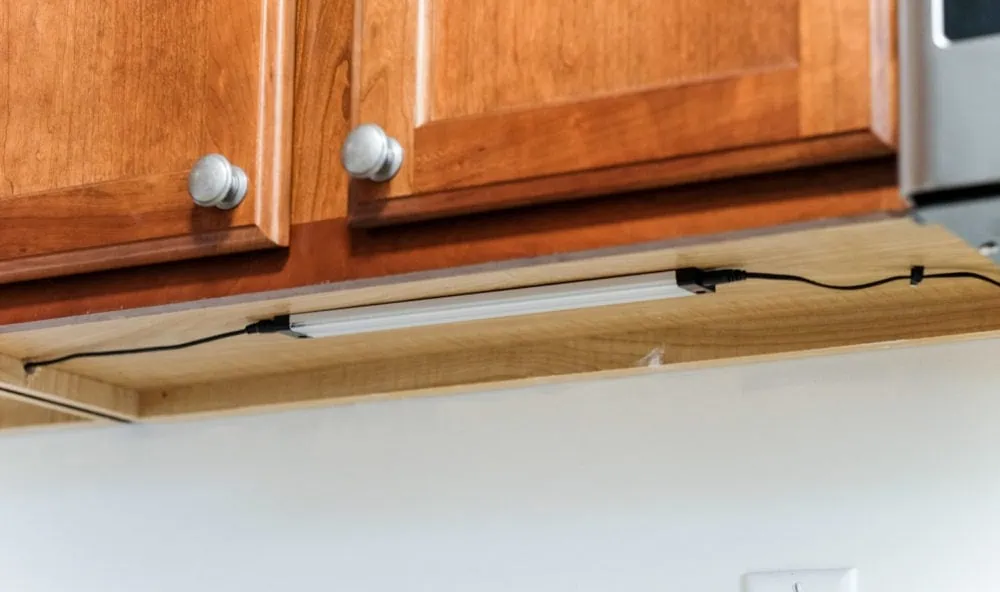
See how we transformed a dark and shadowy kitchen into a well lit and cozy space with this easy DIY kitchen under cabinet lighting project (plus above cabinet lighting also!) For this DIY, we’ve chosen lights that are affordable, and easy to install.
Installing Under Cabinet Lighting: Your DIY Guide
Cabinet lighting was the first project in this budget kitchen makeover here on Joyfully Growing Blog. In addition to LED under cabinet lighting, we did several other affordable kitchen renovation projects.
To see the details on the rest of the projects, see the final kitchen renovation reveal here!
This site uses ads and affiliate content as an Amazon associate earning on qualifying purchases. Disclosure.
Wondering if you can install under cabinet lighting yourself?
The answer is YES! In fact, adding under-cabinet lighting (and above-cabinet lighting) in your kitchen is an easy project that any DIYer can take on. It’s actually easier than you might think, and can be accomplished in about 30 minutes.
Before You Start… Choose A Kitchen Lighting Layout Plan
As with any DIY project, you should always start with a plan. Starting with a plan will save time, energy, and MONEY.
Where is the best place to put under cabinet lighting?
First, decide on how many lights to use, and exactly where each light will be placed. It’s important to space the lights evenly. This will help to achieve the best light pattern.
Pro tip: A good general rule is to center a light fixture under each set of cabinet doors in your kitchen. This won’t work in all cases because some cabinet doors are wider than others, and there isn’t always an even number of doors.
Even though the light fixtures themselves will be hidden from sight under the cabinets, their light output will be visible and promenade – especially in the mornings and evenings when natural light is limited.
Kitchen under cabinet lighting is bright and welcoming as they light up the counters and backsplash beneath. For this reason, it’s important come up with a lighting layout plan.
What type of lighting is best for under cabinets?
The exact lights we used are no longer available – I now recommend EShine LED Under Cabinet Lights. They’re a great upgrade compared to what we used: they’re hand-wave activated, dimmable and they’re cheaper!
EShine offers several sizes: 12 inch, 20 inch, and 40 inch so you can perfectly match the space you’re working with.
These under-cabinet lights are a great choice because they use extremely energy-efficient LEDs, which last nearly forever!
FAQ: What is the best color light (aka color temperature) for under kitchen cabinets?
For a residential kitchen, I recommend using lights that are labeled as ‘warm white‘ or ‘bright white‘ (the hue of light they put out, not the color of the fixture itself).
Lighting manufacturers sometimes use ‘color temperature’ to describe the exact color of light output. Warm white and bright white are typically around 3000K.
Lights in that color temperature range will look great in a residential kitchen.
Should under cabinet lights be warm or cool? Common color temperature ratings are: 2700K, 3000K, 5000K and 6500K. On this color scale, 2700K is a warm yellowish color, 6500K is a cool bluish color; white is somewhere in the middle of the two. For under cabinet lights, avoid warm yellowish lights (below 2700K), as well as cool bluish lights that are 4500K and above.
To learn more about lighting, color temperatures and how to tell how bright a lightbulb is, check out my article The Complete LED Lighting Guide that includes everything you need to know about LED lights and their lumen output, price points, & the best brands to choose for your home.
How To Install Under Cabinet Lighting: Step-by-Step Tutorial
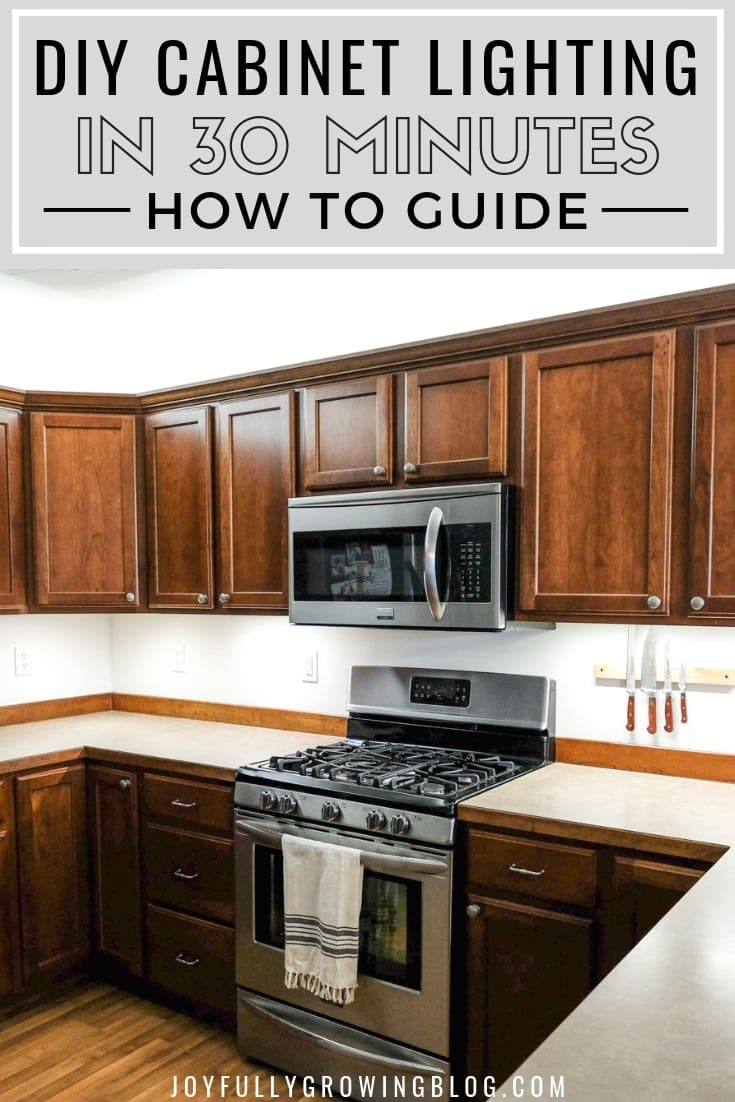
Supplies Needed For the Project:
Step 1: Create A Clean Work Space
Clean out all of the kitchen cabinets and countertops to make room for the installation. This step might seem simple but it’s really important and will make the project go much smoother. Trust me, this will save you time!
To power the under cabinet lights, I recommend using the electrical outlet inside the microwave cabinet. This way, all of the cords remain hidden inside the cabinets.
But how do you get the wires through the cabinets to plug them in? You’ll have to be a little bit brave in the next step, it involves a drill!
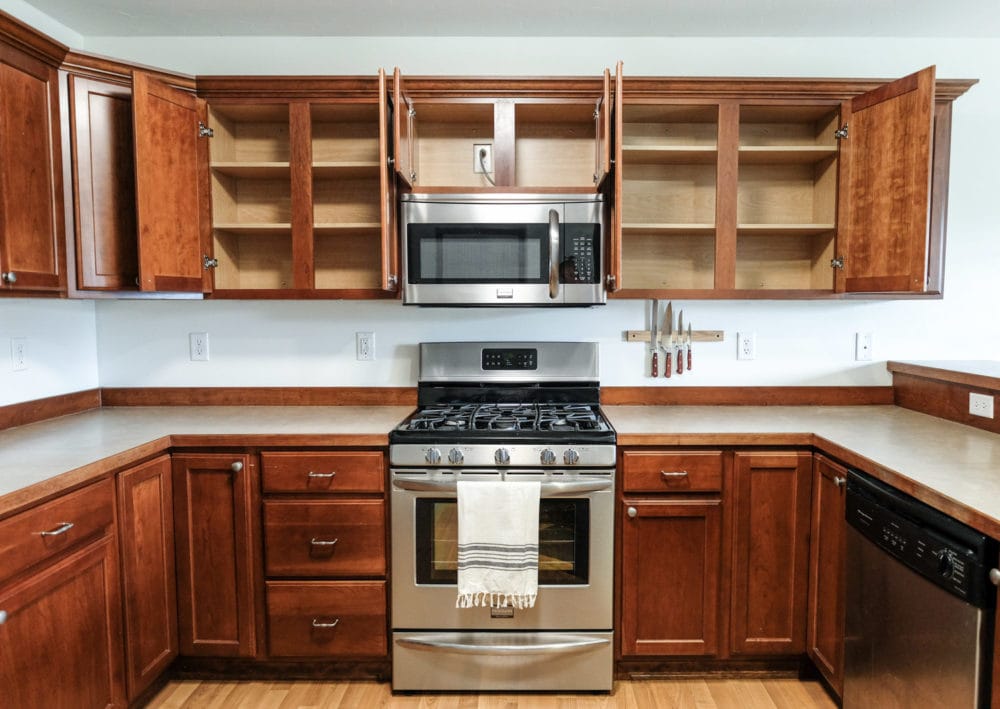
Step 2: Drill Holes For Wires In Cabinets
Taking a drill bit to your nice kitchen cabinets might seem scary, but trust me, you’ve got this! It’s super easy, and you’ll be using a tiny drill bit.
Depending on the layout of your kitchen cabinets, you will probably need to make holes on both sides of the microwave cabinet. With this type of installation, all the under cabinet lights on the left side of the kitchen will be linked together, and plugged into a power supply in the microwave cabinet. All the lights on the right side of the kitchen will be linked together, and plugged into a separate power supply.
Tip: I recommend using separate power supplies for the left and right sides of the kitchen. This keeps it simple and easy. It might be necessary to put a small surge protector inside the cabinet to plug both in. Another option is to use one large power supply, a splitter, and long interconnect cables.
Start in the microwave cabinet where you’ll be plugging the lights in. You will need to drill through the side of the cabinet wall, and then into the next cabinet. In most cabinets, there will be an air gap of dead space between the cabinets (usually about an inch).
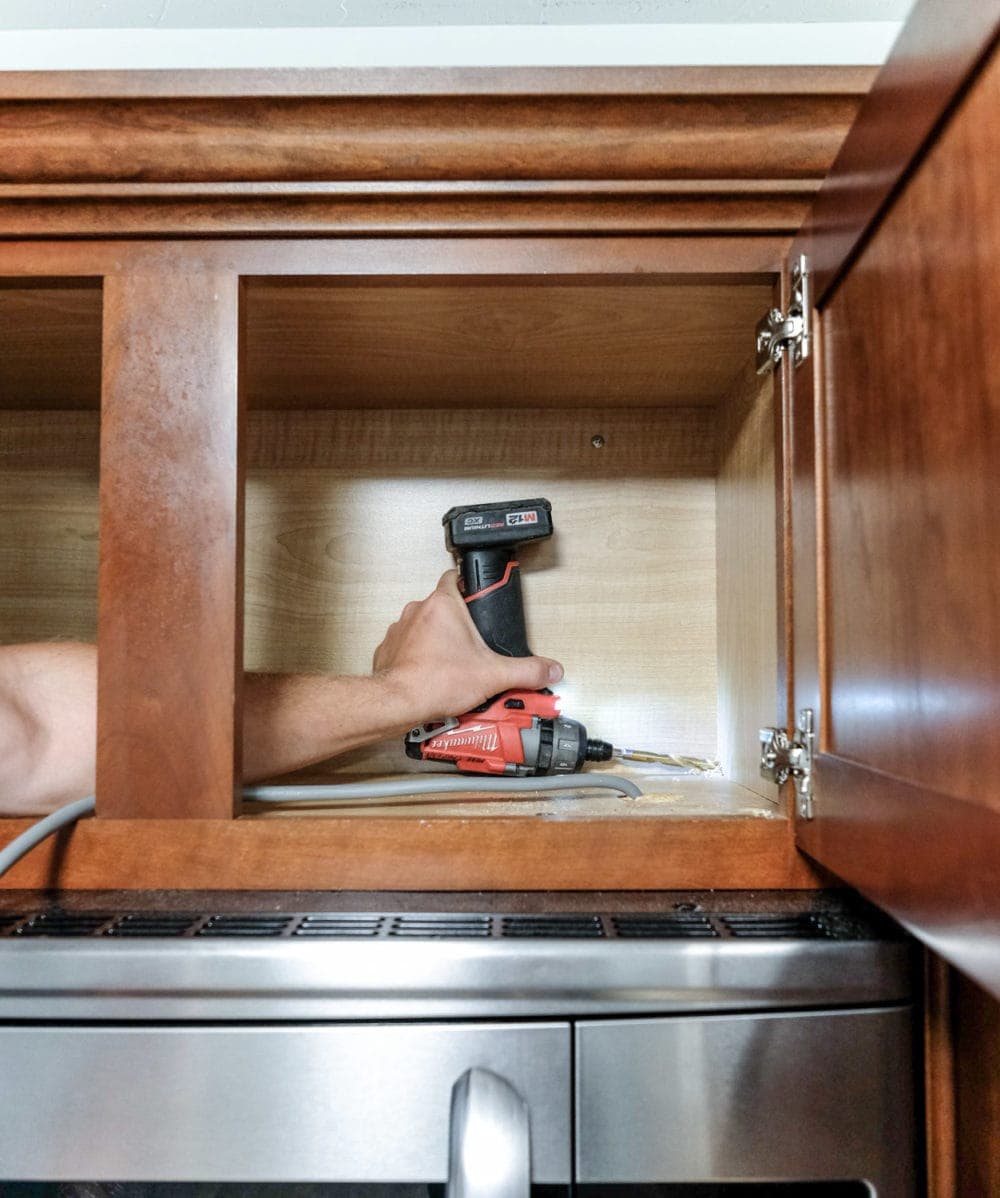
Note: You may have to get creative with how you hold the drill; see the picture above. If you end up needing to hold your drill in a nonconventional way, remember to go slow and be safe. Power tools can be dangerous – always make safety a priority.
To make the holes for the wires, choose the smallest drill bit that is still big enough for your electrical wires to fit though. A 3/8″ drill bit will work most of the time. Use your drill and a drill bit to make holes in the side walls of the microwave cabinet, near the bottom.
Next, drill a hole in the bottom of the cabinet next to the microwave then make a path for the wires to get to the bottom of the cabinet.
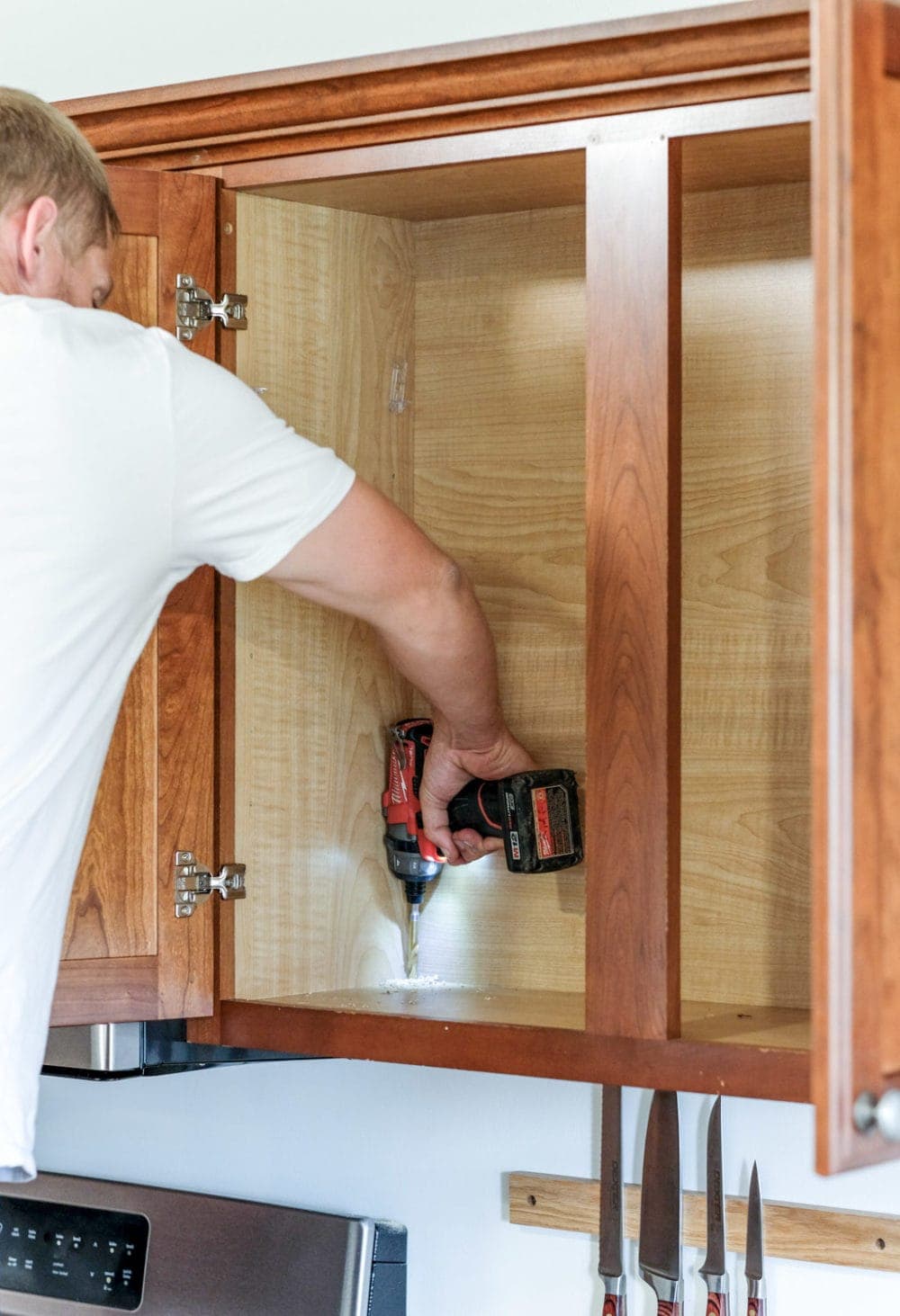
Step 3: Route Wires Through Cabinets
Use the holes that you drilled in step 2 as a pathway to string the electrical wires through.
Start at the top in the microwave cabinet, and pull the wires through the first hole. Continue to pull the wires down through the hole in the bottom of the cabinets where the lights will go.
Make sure to leave the 120v electrical plugin up at the top where it will be plugged into the outlet in the final step. Don’t plug it in yet though!
We want to make sure that nothing is energized until the very end when everything is finished and ready for final testing.
Leave the wires dangling out the bottom of the cabinets for now.
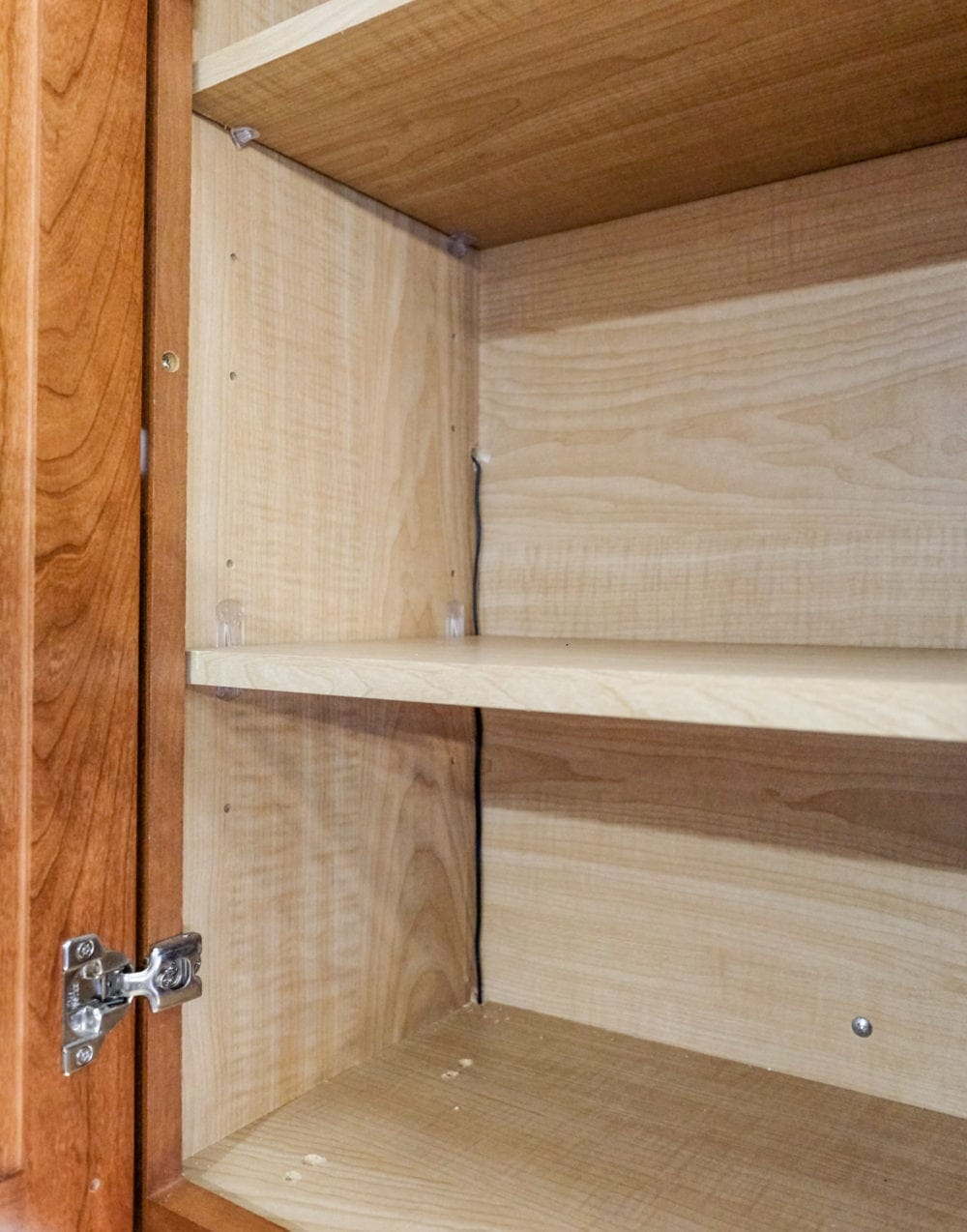
Step 4: Mount The Under Cabinet Lights
Before you start mounting, mark where the lights will be installed on the bottom of the cabinets. EShine lights can be mounted with screws, or the included 3M double sided adhesive.
I prefer using screws to mount the lights, but adhesive strips are a perfectly fine option as well. If you opt for the adhesive strips, make sure to clean the surface well before applying.
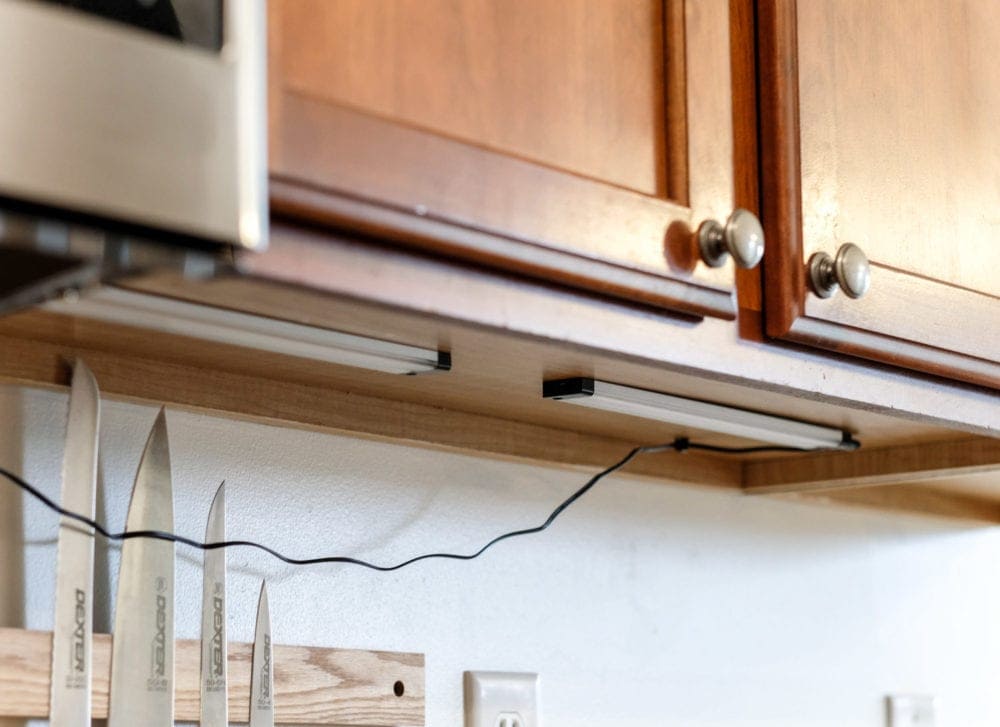
Once all the lights are installed, you can start linking them together. In the next step, we’ll hide and secure the wires to keep them neatly out of sight.
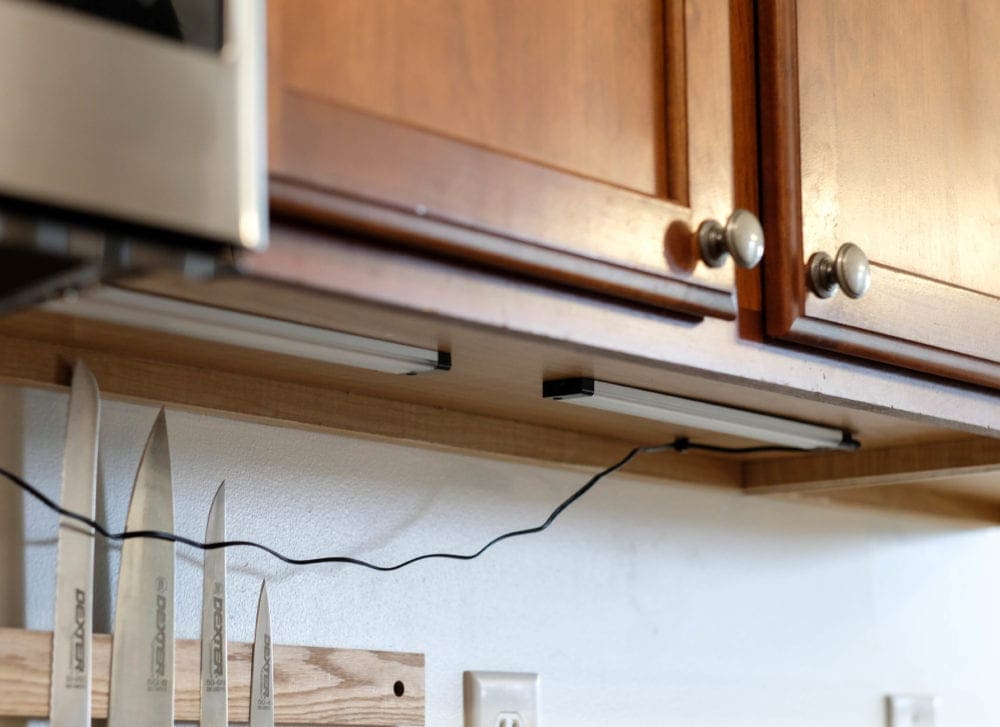
Step 5: Hide And Secure The Power Cords
The lights you purchase should come with ‘wire straps’ to fasten loose wires to the cabinets. Use the included wire straps to hold electrical wires up and out of sight. The wire straps will either be nail-on or screw-in, but both options work equally well.
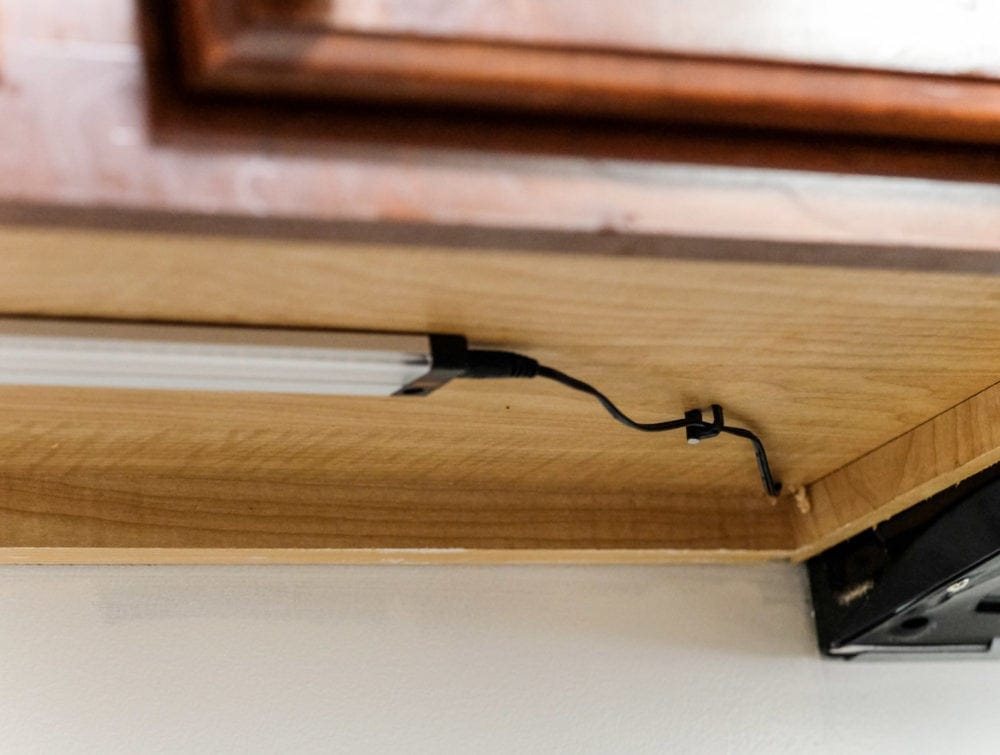
The straps will keep your wires neat, and held up nicely out of sight. Pull the wires taught, and use your hammer, drill, or adhesive strips to fasten the straps directly to the bottom of the cabinets.
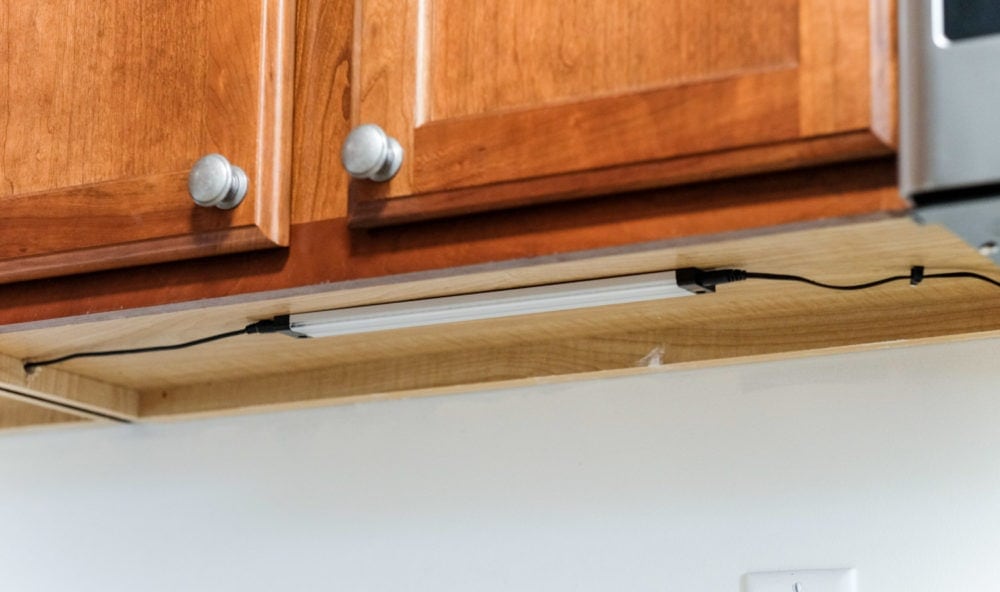
If you have a lot of extra electrical wire between two lights, coil a section into a loop and strap both sides of the loop. See the picture below for an example.
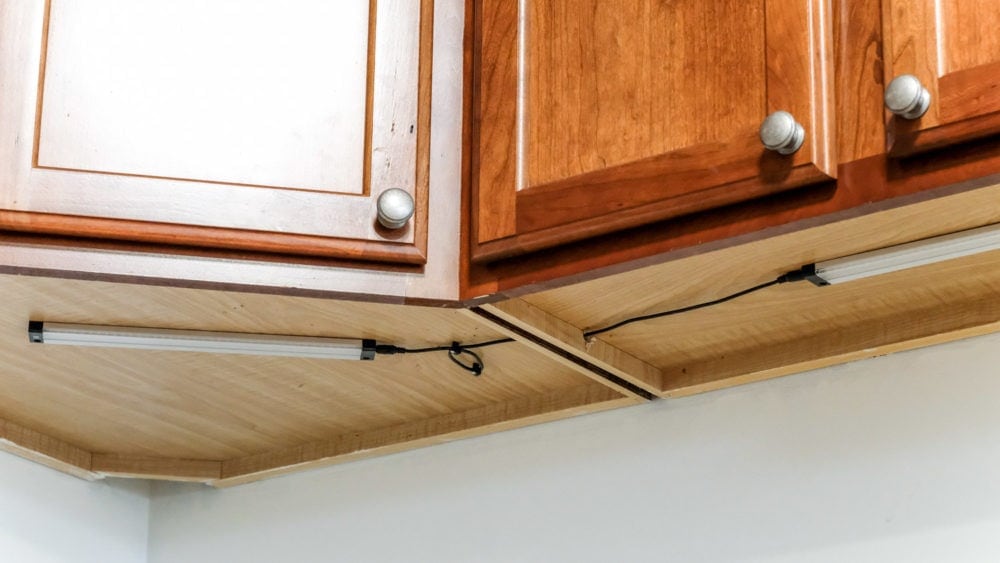
Step 6: Plug In and Admire Your New Under Cabinet Lights!
You’re finished! Plug in your new kitchen under cabinet lights, then take a few steps back and admire your new bright workspace.
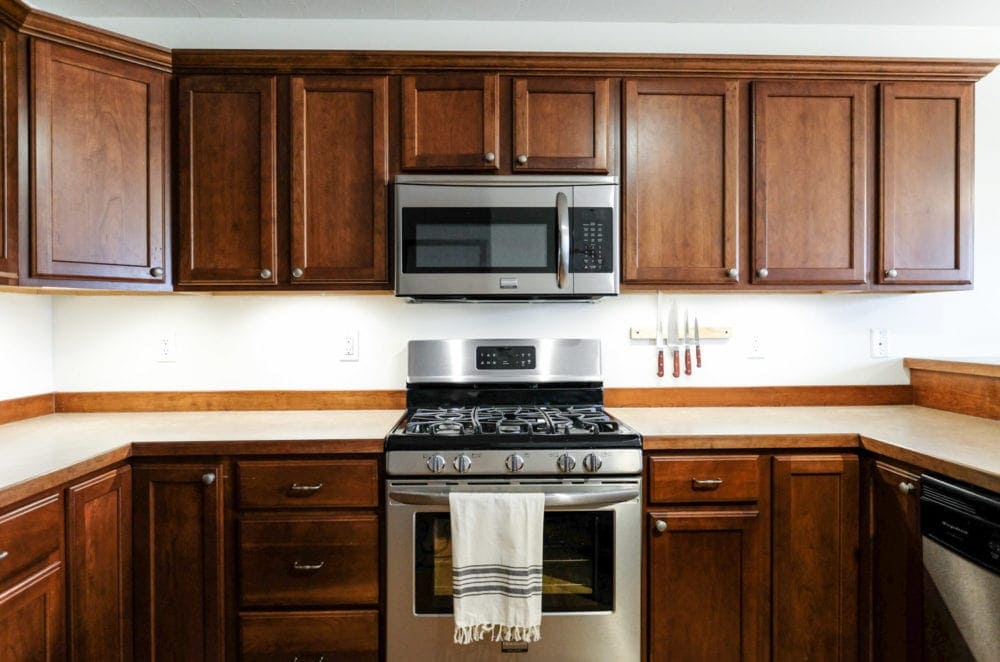
FAQ: How do you turn the under cabinet lights on and off?
The EShine under cabinet light kit is hand wave activated; simply wave your hand directly under the sensor for touch-less control. They’re also dimmable (which is super convenient!) and you can easily adjust the brightness by holding your hand under the sensor.
Next up… Let‘s Add Above Cabinet Lighting
If you made it through the under cabinet lighting tutorial, you’re nearly a cabinet lighting pro now. So why not finish off your lighting project with over cabinet lighting also?
For a pro like you, adding above cabinet lights (also called over cabinet lights) should be a breeze.
What is the best way to light above kitchen cabinets?
Choosing over cabinet lights is a little bit challenging because there is an abundance of cheap, low-quality LED strip lights. After researching and testing several different brands, I can confidently recommend HitLights LED Strip Lights.
They aren’t the cheapest, but when it comes to LED strip lights, you get what you pay for.
These HitLights are the perfect color at 3000K, as well as very bright and energy efficient. They come in 10 FT rolls, so measure your cabinets to see if you will need to buy more than one 10FT roll of lights.
The power supply needs to be purchased separately. This 96W HitLight Power Supply will work with up to 30 FT of LED Strip Lights.
How to Install Over Cabinet LED Light Strips: Step-by-Step Tutorial
This process is very similar to installing under-cabinet lights. The only difference is that instead of drilling holes down toward the bottom of the cabinets, you’ll be going up toward the top.
Above Cabinet Lighting Supplies
- 10FT HitLight 3000K Strip Light
- Power Supply
- Strip Light Connector (only if you need to connect multiple 10FT rolls)
- Power Drill
- Drill Bit Set
Step 1: Adhere Strip Lights
Start all the way to the left or the right side of the cabinets (don’t start in the middle). This way you can use one continuous run of lights.
To get started, remove the plastic lining from the LED light strip, and adhere the lights along the inside edge of the upper cabinets.
If your cabinets are more than 10 FT long, use this HitLight connector to hook up the next roll of lights.
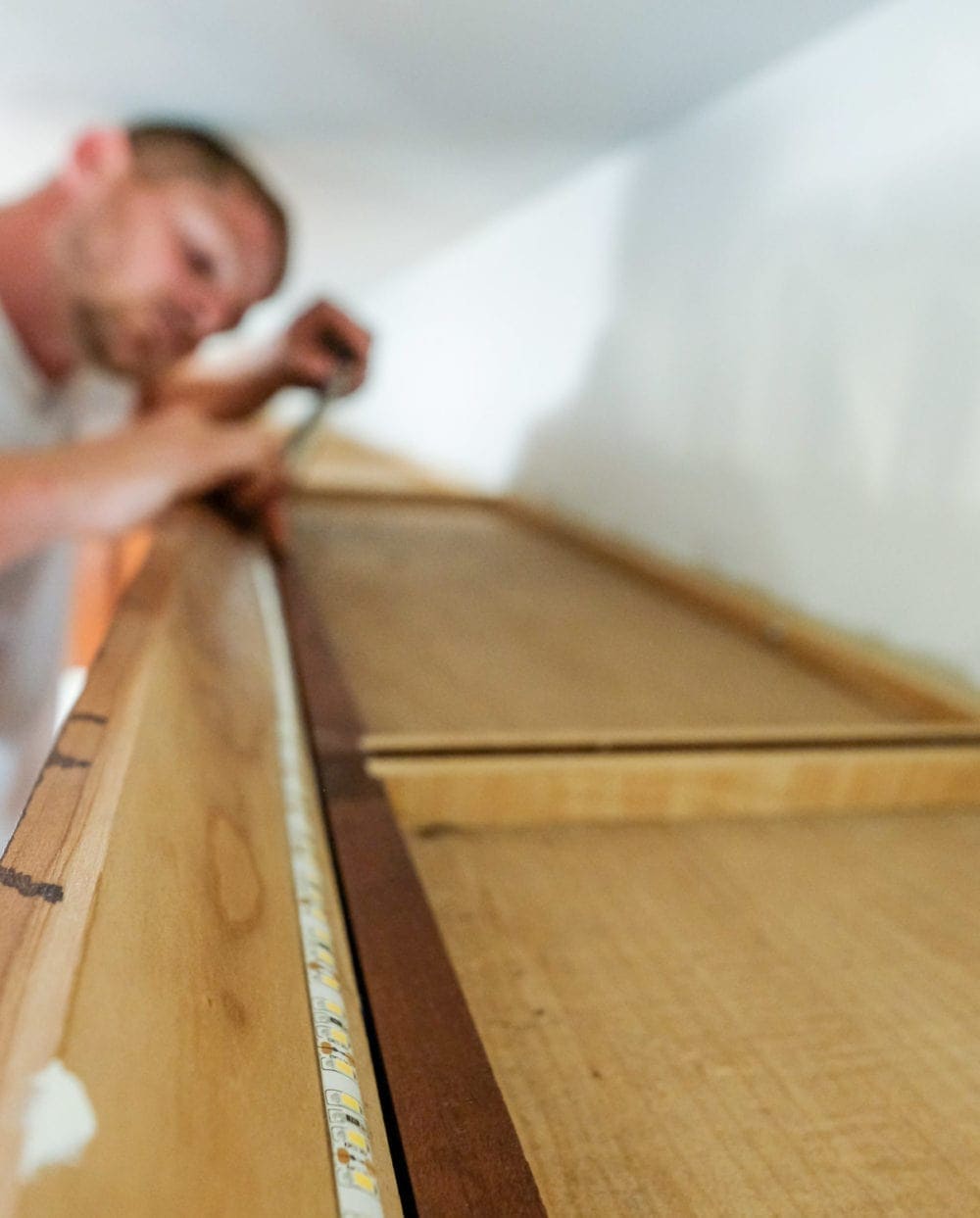
Step 2: Drill Holes and String Cords
Just as in Step 2 of the under-cabinet section, you’ll want to start inside the cabinet above the microwave. The electrical wire for the over-cabinet lights will go to the microwave cabinet to be plugged in.
Use a drill (this is my go-to) to cut a hole in the top of the cabinet. Use the hole to route the power cord through to the inside of the cabinet.
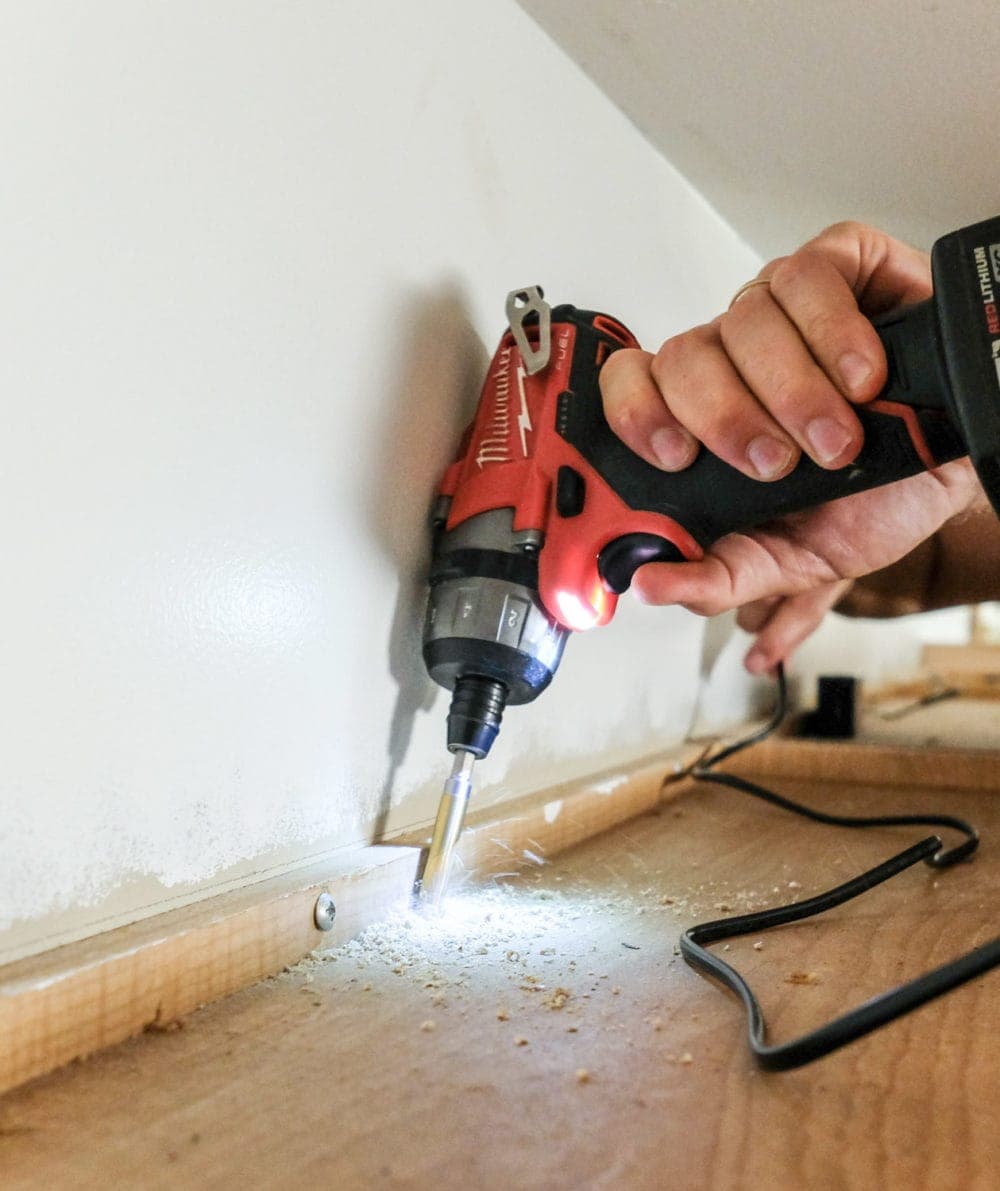
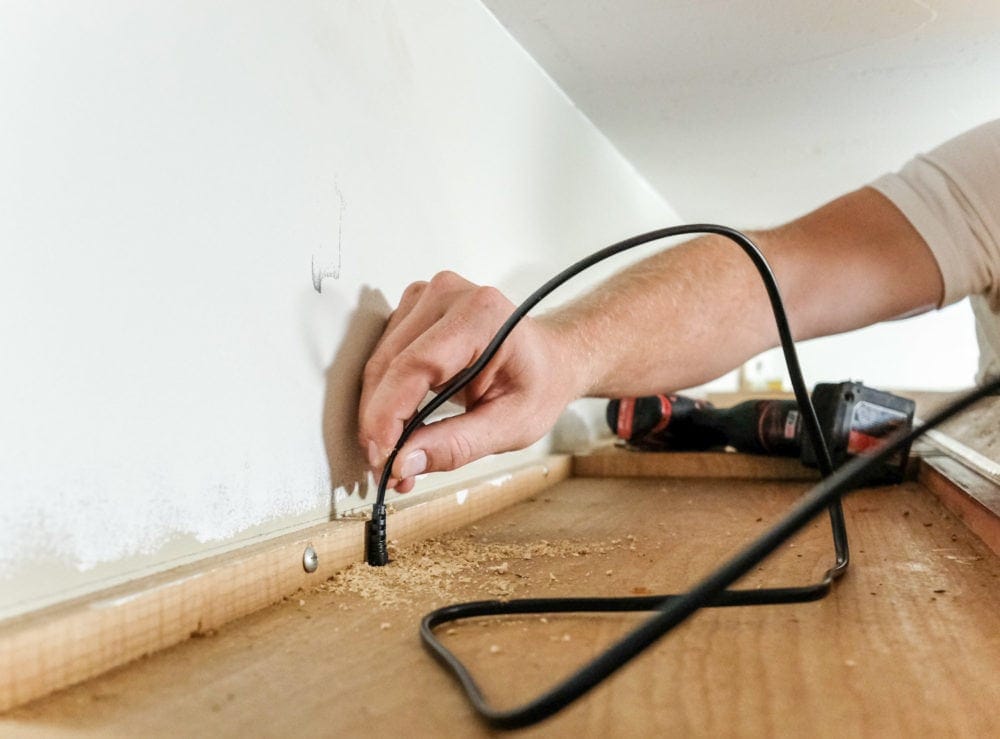
Step 3: Connect Power Cord and Admire!
Here is the fun part – plug in your new kitchen lights and check them out!
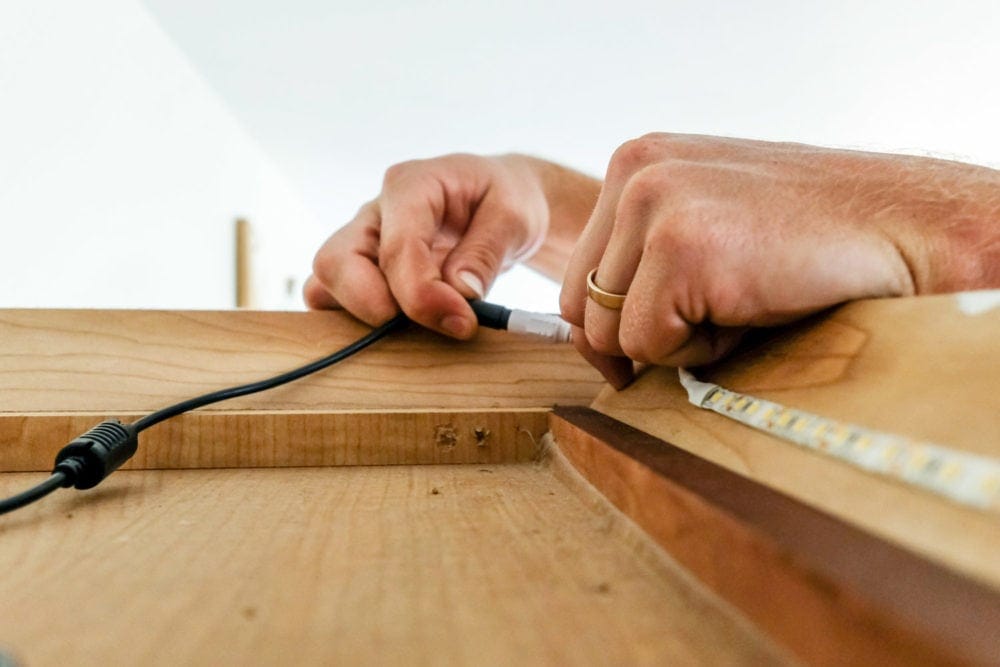
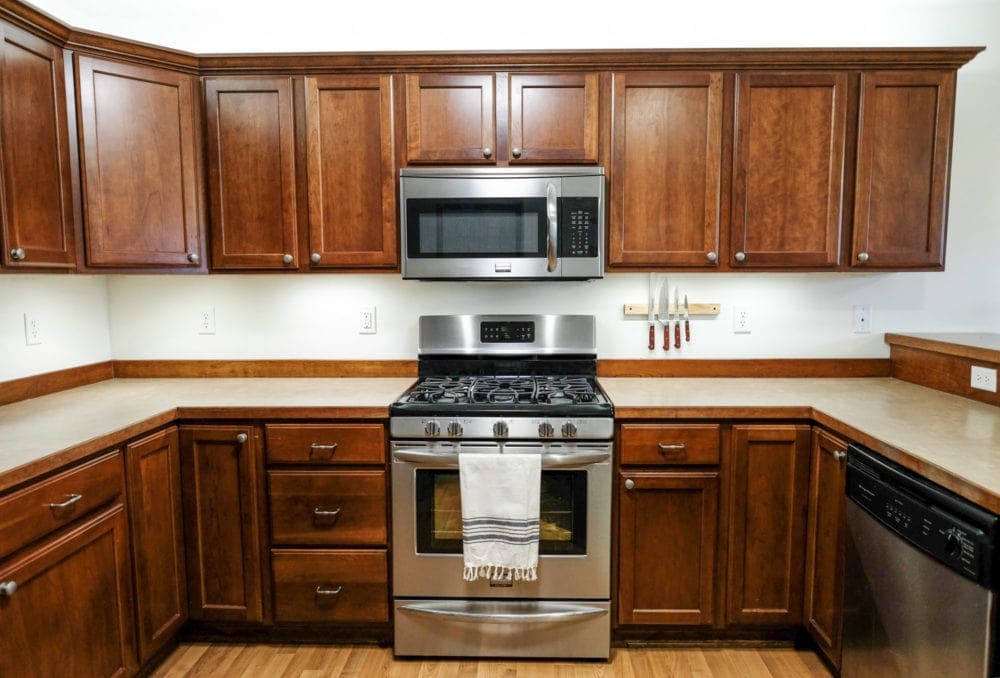
This simple DIY cabinet lighting solution makes ALL the difference in this space! And a project that takes 30 minutes or less is MY kind of project!
FAQ: How do you turn the over cabinet lights on and off?
These above cabinet lights are designed to stay on 24/7. There is no switch, and the only way to turn them off is to unplug the power supply. Because the lights are so efficient, it costs almost nothing to leave them on all the time.
Before and After Kitchen Cabinet Lighting
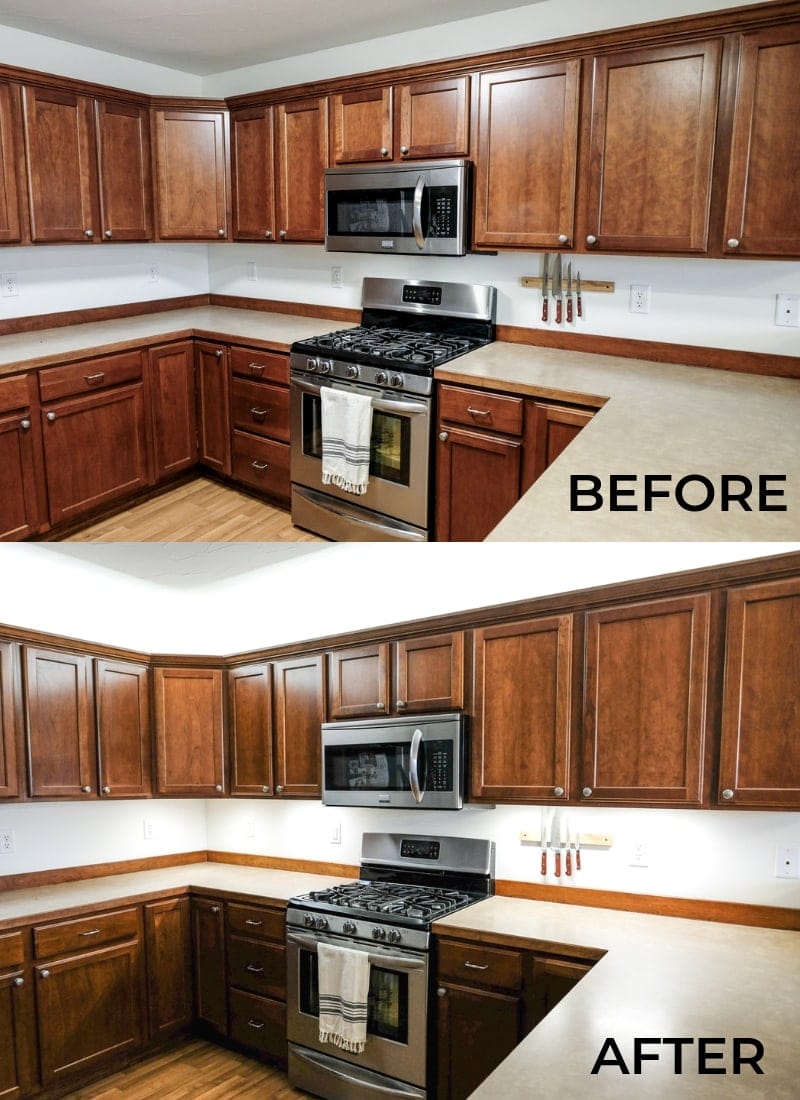
Lighting can create a warm and cozy feel, and these cabinet lights are perfect for that! No more fumbling around in the dark searching for a light switch!
So, what do you think? Would you try this easy 30 minute DIY cabinet lighting project?
UP NEXT: See the budget kitchen makeover reveal here!
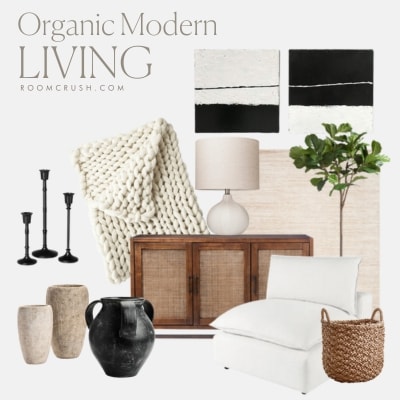

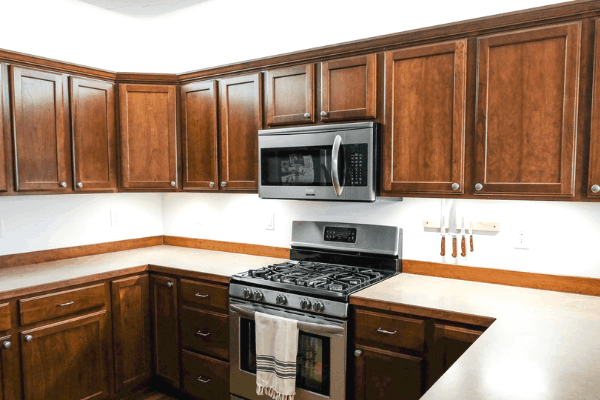
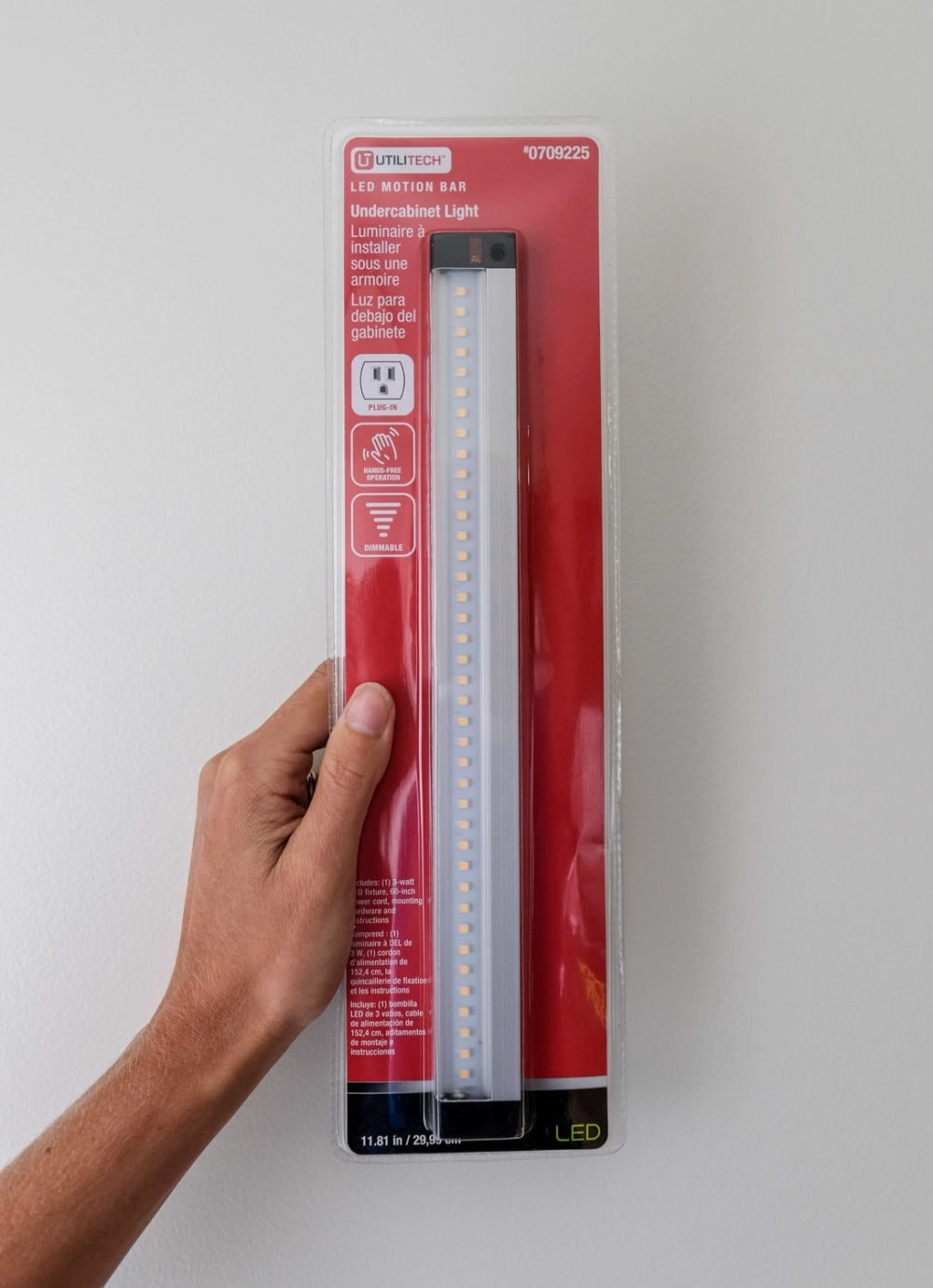
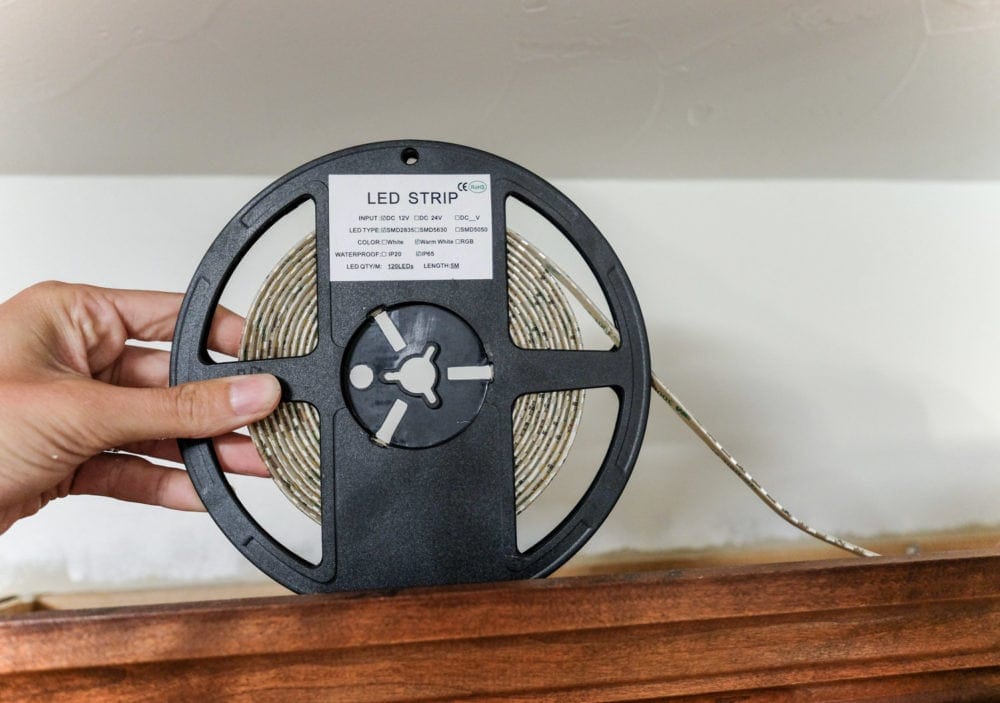
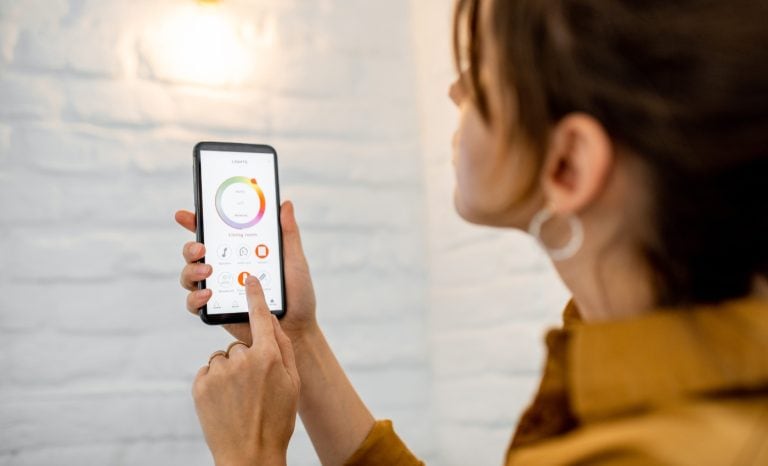
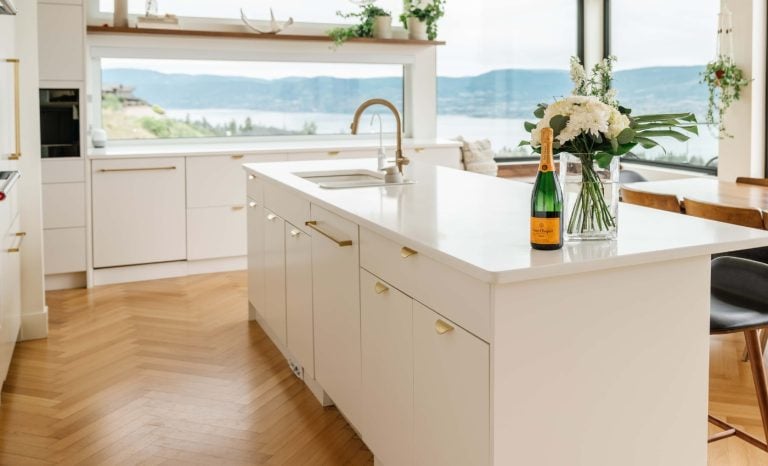
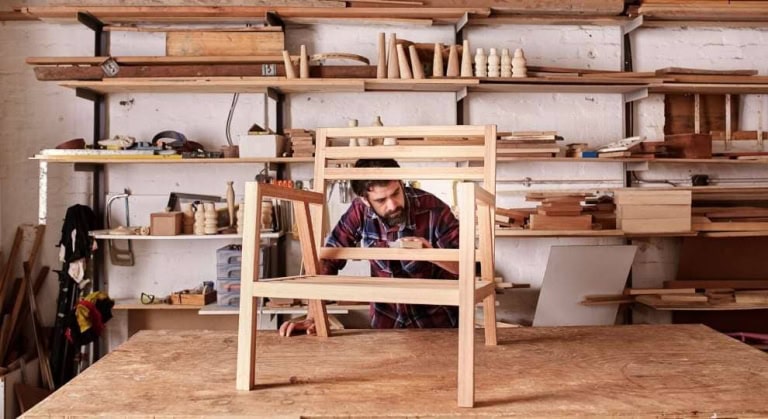
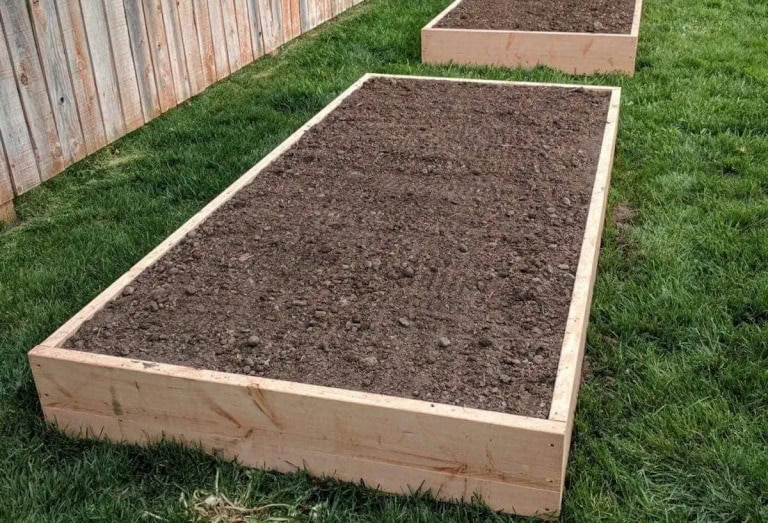
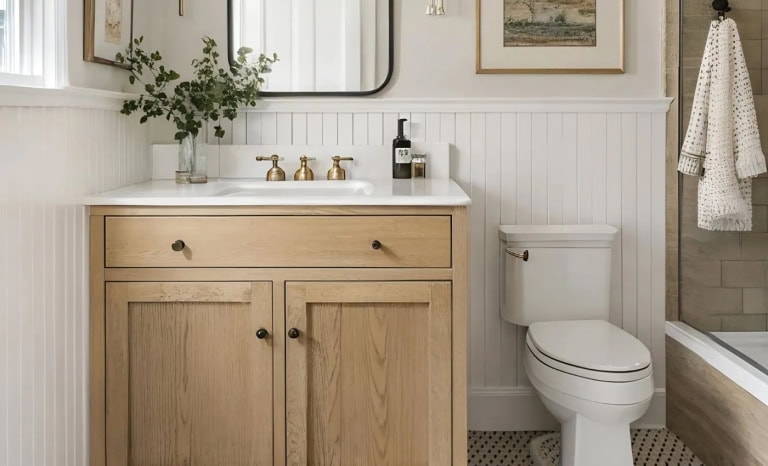
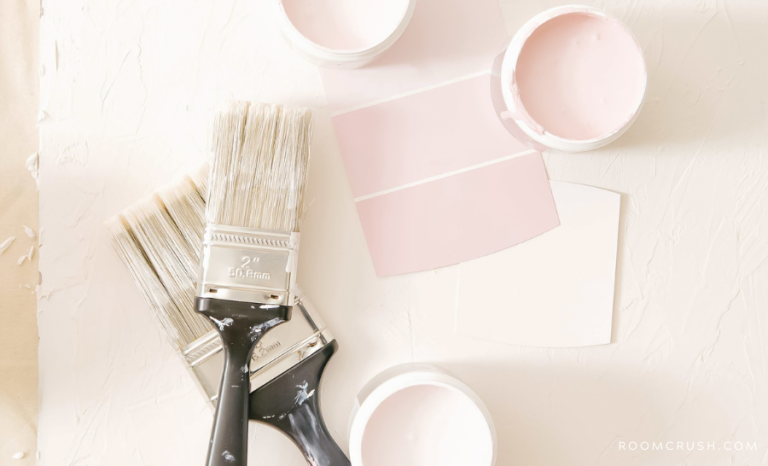
Awesome project – answered all my questions. Thank you!!!
Oh Mandy, I’m so glad! Thank you!
I really like your idea to use the outlet above the microwave but how did you get the lights to go in opposite (left and right) directions on one power supply cord in the cabinet? Do you have more than 1 or 2 outlets in the cabinet, did you use multiple power cords or a surge protector? I appreciate any info! Thank you.
We started the light strip on one end of the cabinets, and ran the power cord to that end. That way the lights are one continuous run and do not need two power supplies. If the power supply cord is not long enough to reach the end of the cabinets, you may need to use a small extension cord to reach.
Do the light bars and light strips have on/off switches? Or do you to climb up and plug them in each time you want to turn them on?
The under cabinet lights have on/off switches that are controlled with motion sensors so all you have to do is wave your hand underneath to turn them on or off. The strip lights above the cabinets have to be unplugged and plugged back in, however it is fairly easy when you use the outlet over the microwave. We choose to keep the upper lights on 24/7 as accent lighting.
Let me know if this didn’t answer your question and I can try to explain it differently! Thanks so much for asking!
When the lower lights come on by motion, do all the sections come on together since they are all connected? Or just the section you triggered? Thanks!
No, just the section you wave your hand directly under. We left ours on all the time since they were LED, to make it easier.
this is very helpful love it -Jamie Q
I enjoy a good DIY project as long as it isn’t electrical. You guys did a very nice job. Especially the Kitchen!
Thank you! This project wasn’t too complicated, just plugging into an existing outlet! Ha, my kind of electrical DIY 😉